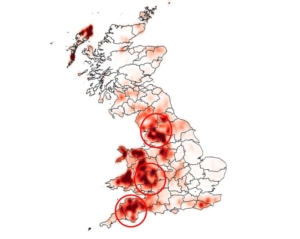Update – For Flock’s Sake Let’s Stop Scab Together
There are estimated to be about 8-10,000 outbreaks of sheep scab in the UK every year with many flocks infested persistently in areas of high scab prevalence. Scab costs the UK sheep industry between £80- £200 million per year (Nixon et al., 2020). With some populations of sheep scab mites in the UK now known to be resistant to the injectable macrocyclic lactones (Sturgess, Osborne et al., 2019), it is imperative that the sheep industry makes a concerted effort to bring this disease under control.
‘For Flock’s Sake Let’s Stop Scab Together’ is a project funded by the Rural Development Programme for England (RDPE) starting in April 2021. Its objective is to demonstrate the effectiveness of a community-led approach to improve the control of sheep scab in three hotspot areas in England. Within each hotspot, there are a number of ‘clusters’ of farms that share common boundaries or use the same common grazing, where the aim is to foster cooperation in the control of scab. Running over two years, the project offers up to 300 participating farmers a unique combination of on-farm advice, best practice training, free blood testing using the sheep scab ELISA test developed by Moredun. It also covers the costs of visits by their local veterinary surgeon to allow two sets of blood samples for ELISA testing, plus a face-to-face advisory visit by the vet for each farm to discuss scab control and biosecurity.
The ELISA results for each farm are carefully analysed in relation to the scab-history of the farm in question and its neighbours, before advice is given about whether treatment, or follow up monitoring and inspection, are required. The key aspect of this approach are communication, cooperation and co-ordination within clusters.
The three hotspot areas in England where scab currently presents a persistent problem are: The North (coordinated by CFN); the Midlands (coordinated by ADAS) and the South West (coordinated by NSA). In each cluster, farm vets work directly with their farmer clients and with the regional coordinators, resulting in close working relations. This is an exciting community-led approach to sheep scab control, bringing together people with a wide range of expertise, working collaboratively with farmers to bring this terrible disease under control. The overarching aim is to provide an exemplar that others can use to control sheep scab in their own areas.
Progress to date
Since April the coordinators have been working hard in their areas and the three hotspots are approaching their limit in terms of the numbers of participating farmers for which funding is available. The levels of engagement and enthusiasm among the farmers has been high and in some clusters the coordinators have more farmers than can be funded under current budgets. There are also a significant number of vets involved in the clusters and in most areas they have been very keen to get involved and have been instrumental in encouraging their clients to sign up.
By the end of October, 113 sets of blood samples had already been processed and results reported back to the coordinators and vets. Discussion regarding coordination treatments are now taking place in many areas, with farmers being encouraged to plunge dip where scab has been diagnosed and where it is possible to do so.
Rebecca Mearns, Senior Veterinary Advisor at Biobest, where the ELISA blood test has been offered since 2017. “It’s good to see the ELISA blood test being used in this way for the RDPE project. Controlling sheep scab in the hotspot areas is a real challenge and if we can use all available tools to make progress in these areas, then it bodes well for control on a wider scale.”
Karen Swindlehurst is a vet in Yorkshire who is coordinating two clusters. “The farmers in my two clusters are really keen to be involved and have come together to share results and plan treatments’. We started blood testing at the summer gather and about 20% have proved to be positive so far. It has been an amazing response and the discussion has really opened up between neighbours about how they can go about coordinating their treatments. As their vet, the project is also giving me the opportunity to sit down with them and talk through issues such as biosecurity and opening up the way to more proactive health planning in the future’.
As expected, it has been harder to win farmer engagement in areas where there are not the same historical links of cooperation present, for example such as exists between farmers around common grazing. These clusters tend to be less well defined and this has been a particular challenge in the Midlands, where Kate Phillips, Independent Sheep Consultant, has been driving the project in the Long Mynd and Stiperstones area of Shropshire. “Many farmers have been very keen to be involved, recognising the cost and effects of sheep scab in their flocks, but we have a few farmers who are still reluctant to take part. So far we have about 75 farmers signed up and have tested over 50 flocks with about a quarter proving positive. Our local vets have been extremely supportive and the team is working very well together. With peer pressure and concerted effort from the team we are likely to fill our complement of 100 farmers”.
References:
Sturgess-Osborne, C., Burgess, S., Mitchell, S., Wall, R. (2019) Multiple resistance to macrocyclic lactones in the sheep scab mite Psoroptes ovis. Veterinary Parasitology 272, 79-82.
Nixon E.J., Wall, R., Vineer, H., Stubbings, L. (2020) The high cost of sheep scab. Veterinary Record, https://doi.org/10.1136/vr.m3888
The three hotspot areas in England where the project is being run are:
- The North (coordinated by Cumbrian Farmer Network)
- The Midlands (coordinated by ADAS)
- The South West (coordinated by NSA)

